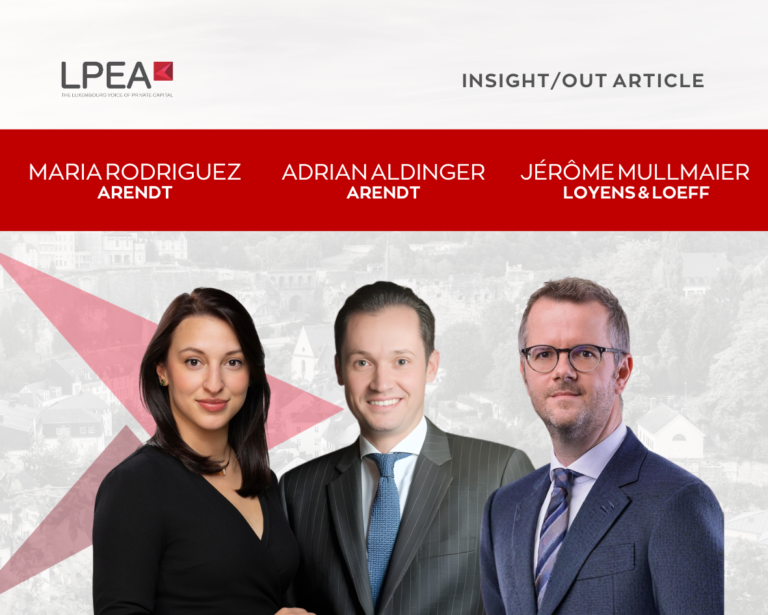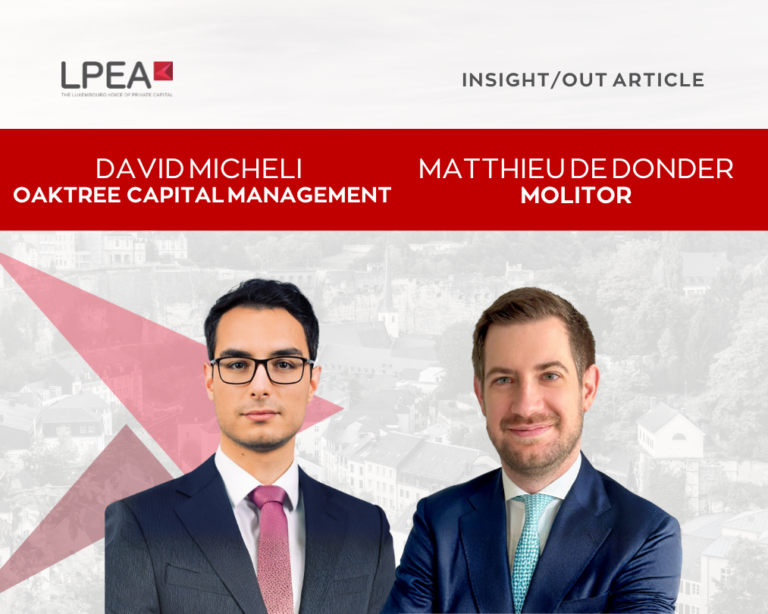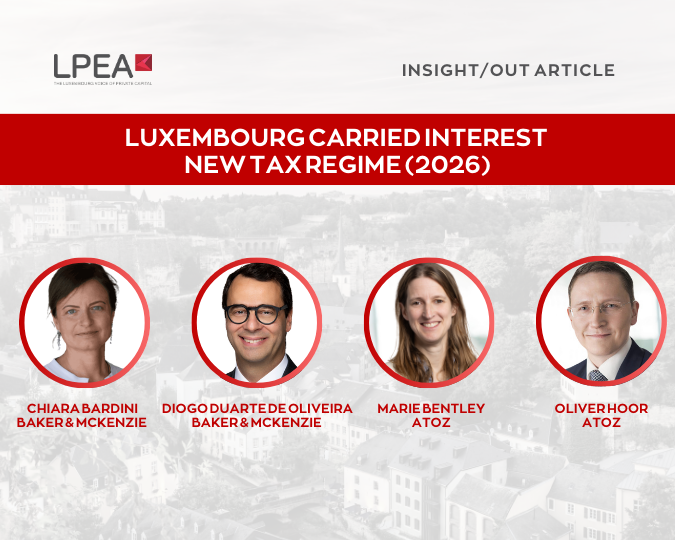Substance Requirements in a Private Equity Context: Where to draw the red line
by Oliver R. Hoor, Partner, Atoz Tax Advisers
Oliver R. HOOR is a Tax Partner (Head of Transfer Pricing and the German Desk) with ATOZ Tax Advisers (Taxand Luxembourg).
“Luxembourg finance companies need to have a real presence in Luxembourg. For this purpose, at least 50% of the managers/directors should be (professionally) resident in Luxembourg.”
1. INTRODUCTION
2. THE NOTION OF SUBSTANCE
3. THE IMPORTANCE OF SUBSTANCE IN INTERNATIONAL TAXATION
3.1. MANAGING TAX RESIDENCY
3.2. LUXEMBOURG FINANCE COMPANIES
3.3. ANTI-TREATY/ANTI-DIRECTIVE SHOPPING RULES
3.4. GENERAL ANTI-ABUSE RULES
3.5. PRINCIPAL PURPOSES TEST
3.6. MANAGING BENEFICIAL OWNERSHIP
4. SUBSTANCE REQUIREMENTS IN AN EU CONTEXT
5. CONCLUSION
1. Introduction
Luxembourg is a major hub for the structuring of private equity investments in and through Europe. Private equity investments are typically structured via a Luxembourg or a foreign fund and Luxembourg holding companies that acquire the target companies. Luxembourg companies involved in these cross-border structures may, or may not, rely on benefits provided under the domestic tax laws of the investment jurisdictions (in accordance with EU Directives) or under applicable tax treaties (for example, reduced or zero withholding tax rates).
However, when Luxembourg companies rely on such benefits, they often need to comply with certain substance requirements. This is because of anti-abuse rules provided under the tax laws of the investment jurisdictions and tax treaties. Indeed, over the years, countries around the globe have implemented a variety of anti-abuse legislation to protect their own tax base against erosion. Far from being uniform, the way anti-abuse legislation is designed varies from one state to another and may be rather restrictive or broad in its scope of application.
The European Anti-Tax Avoidance Directive (ATAD) will require EU Member States to implement certain BEPS measures including several anti-abuse provisions such as a controlled foreign company (CFC) rule and a general anti-abuse rule (GAAR). These rules need to be implemented as from 1 January 2019. In addition, a principal purpose test (PPT) will be included in tax treaties concluded by Luxembourg through the multilateral instrument (MLI) which has been developed as part of the Base Erosion and Profit Shifting (BEPS) Project for implementing BEPS measures in bilateral tax treaties.
This article analyses the importance of substance in Luxembourg private equity structures and considers the limits of anti-abuse legislation in an EU context.
2. The notion of substance
Substance is a key element in international taxation and is relevant for the application of both domestic tax law and tax treaties. More precisely, substance is crucial (i) for managing Luxembourg tax residency, (ii) to avoid a situation in which a corporate structure is (partially) disregarded under foreign anti-abuse provisions and (iii) to ensure that Luxembourg companies are considered as the beneficial owners of their income.
The notion of substance involves a number of elements such as
- Infrastructure (equipment, facilities and employees, etc.),
- Corporate governance (directorship, involvement of Luxembourg directors, place where decisions are taken, etc.),
- Functional and risk profile,
- Legal documentation and contractual terms,
- Transfer pricing and related documentation,
- The actual conduct of business activities, and
- Business purpose.
However, when it comes to substance, there is no “one-size fits all” approach. Instead, the level of substance has to be tailored to each investment structure, responding to the requirements in the other jurisdictions involved and considering the existing operations of investors in Luxembourg and abroad. Evidently, there exists a natural tension between an increased level of substance and the comfort that goes with it, on the one hand, and cost efficiency, on the other.
In practice, substance may be organized in different ways. A Luxembourg investment structure may, for example, be managed through a Luxembourg master holding company or a management company with employees. As a different model, it is still possible to outsource certain functions to qualified service providers to the extent that these activities are supervised by the managers/directors of the Luxembourg companies.
3. The importance of substance in international taxation
3.1. Managing tax residency
From a Luxembourg tax perspective, a company is considered tax resident in Luxembourg if its statutory seat or its central administration (that is, its place of effective management) is located in Luxembourg.
A key risk that requires careful management is ensuring that a Luxembourg company is not considered to be resident in another country by virtue of the effective management being exercised within the territory of that country. In case of dual residency, tax treaties concluded by Luxembourg regularly provide that the state of residence for tax purposes will be in the country in which the company is effectively managed.
It is therefore critical that all important strategic and commercial decisions which are necessary for the conduct of the company’s business are actually taken in Luxembourg.
3.2. Luxembourg finance companies
Luxembourg companies performing financing activities have to comply with the substance requirements set out in the Luxembourg transfer pricing circular.[1] According to this circular, Luxembourg finance companies need to have a real presence in Luxembourg. For this purpose, at least 50% of the managers/directors should be (professionally) resident in Luxembourg.
While it is stated that a finance company should have qualified personnel, some of the functions may still be outsourced to the extent that these functions are supervised by the managers/directors of the company. The Luxembourg company should further hold its annual shareholder meeting(s) in Luxembourg at its registered seat and not be considered as tax resident in another jurisdiction.
3.3. Anti-treaty/anti-directive shopping rules
Treaty and directive shopping entails the unintended use of tax treaties or EU directives by residents of third states. Many countries have implemented anti-treaty/anti-directive shopping rules in their domestic tax law in order to avoid the application of tax treaties or EU directives where the direct recipient of a specific item of income has no substance or is not considered to be the beneficial owner of such income.
In an EU context, however, the freedom of EU Member States with regard to the design and interpretation of such anti-abuse provisions is restricted by the case law of the CJEU (see section 4).
3.4. General anti-abuse rules
Many countries, including Luxembourg, have implemented a general anti-abuse rule (GAAR) in their tax law that targets abusive arrangements by which taxpayers try to circumvent certain tax treatments through the use of artificial legal means.
EU Member States that did not yet implement such a provision in their domestic tax law will have to implement a GAAR as provided in ATAD. Under the Directive, non-genuine arrangements that are not put in place for valid economic reasons (which reflect economic reality) and which are carried out for the main purpose (or one of the main purposes) of obtaining a tax advantage shall be disregarded.
The explanatory memorandum to the provision states expressly that the proposed GAAR is designed to reflect the artificiality test of the CJEU. Thus, in an EU context, the scope of the GAAR should be limited to clearly abusive situations or wholly artificial arrangements as defined by the CJEU (see section 4).
3.5. Principal purposes test
Through the MLI, a PPT will be included in all tax treaties concluded by Luxembourg.[2] The PPT would deny a treaty benefit[3] where it is reasonable to conclude that obtaining this treaty benefit was “one of the principal purposes” (emphasis added) of any arrangement or transaction unless the taxpayer is able to establish that granting the benefit would be “in accordance with the object and purpose” of the relevant treaty provisions.
The 2017 Update to the OECD Model and the related Commentary provide for guidance on the interpretation and application of the PPT. According to this guidance, the PPT requires an in-depth analysis of all facts and circumstances of each case in order to determine whether obtaining the benefit was a principal consideration and would have justified entering into an arrangement or a transaction that has resulted in the benefit. Thus, tax authorities should not easily conclude that (one of) the principal purpose(s) was to obtain benefits under a tax treaty.
Moreover, three examples included in the Commentary are of particular relevance when it comes to analysing alternative investments such as private equity investments (i.e. examples K, L and M relating to Paragraph 9 of Article 29). It is interesting to note that in each of the three examples it is concluded that it would not be reasonable to deny the benefits provided under the treaty.
The Commentary stresses though that when reading the examples, it is important to remember that the application of the PPT must be determined on the basis of the facts and circumstances of each individual case. Furthermore, the examples are meant to be of mere illustrative nature and should explicitly not be interpreted as providing conditions or requirements that similar transactions must meet in order to avoid the application of the PPT.
In tax treaties concluded between EU Member States, the PPT should be applied in accordance with relevant case law of the CJEU (see section 4).
3.6. Managing beneficial ownership
The notion of “beneficial owner” plays a prominent role both in determining whether a person qualifies for tax treaty benefits and in the allocation of taxing rights between two Contracting States in respect of dividends, interest and royalties.[4] Where either dividends, interest or royalties derived from a Contracting State are paid to a resident of the other Contracting State, the taxing right of the source state is in general restricted to a certain percentage of the gross amount or even excluded (in the case of royalties).
However, tax treaties typically stipulate that the person claiming the treaty benefits (i.e. reduced or zero withholding tax rates in the source state) must be the beneficial owner of the dividends, interest or royalties. Thus, the source state is not bound to grant the benefits of Articles 10 (2), 11 (2) and 12 (1) solely because the income is received by a resident of the other Contracting State. Instead, the recipient must be the “beneficial owner” of that income.
The question of “beneficial ownership” is particularly problematic in group situations where, for example, holding companies perform intermediary financing activities or receive dividend income from their subsidiaries. In these circumstances, the application of the concept of “beneficial ownership” requires an analysis on a case-by-case basis. Here, it is crucial for taxpayers to be able to evidence the economic grounds for these operations in order to prove that the intermediary company was not incorporated for the sole purpose of benefiting from the limitation on source state taxation. In practice, Luxembourg companies should at least not be obliged contractually to immediately transfer the income received to the investors.
4. Substance requirements in an EU context
A large part of the private equity investments structured via Luxembourg is made in EU Member States. In these circumstances, anti-abuse legislation implemented under the domestic tax law of the investment jurisdiction and in tax treaties concluded by Luxembourg have to be designed and applied in compliance with EU Law as interpreted by the CJEU.[5]
In two recent landmark decisions involving German anti-abuse legislation (Cases C-507/16 and C-613/16 of 20 December 2017) and a principal purpose test under French tax law (Case C-6/16 of 7 September 2017), the CJEU put significant limitations on the scope of anti-abuse legislation in an EU context.
Notably, the CJEU requires anti-abuse legislation to focus on “wholly artificial arrangements” which do not reflect economic reality and the purpose of which is to unduly obtain a tax advantage. Thus, tax authorities should not easily consider the presence of abuse or fraud. Taxpayers are free to rely on their EU freedoms when structuring investments and „tax jurisdiction shopping“ is a legitimate activity in an internal market even if the choice of the jurisdiction is principally based on tax considerations.
When assessing the existence of fraud and abuse, tax authorities may not rely on predetermined general criteria. Instead, tax authorities have to carry out an individual examination of the whole operation at issue.
An abusive situation does not depend only on the intention of the taxpayer to obtain tax benefits (i.e. a motive test) but requires the existence (or absence) of certain objective factors including an “actual establishment” in the host state (for example, premises, staff, facilities and equipment) and the performance of a “genuine economic activity”.
As regards the existence of an actual establishment, the CJEU does not seem to require an extensive level of substance. As a rule of thumb, the substance should be appropriate for the activities performed by the company. Furthermore, it has been explicitly stated that when analysing the substance of a company, it is necessary to not only analyse the situation of the entity in question but of the group as a whole. It may even suffice if a Luxembourg company relies on the staff and premises of another Luxembourg group company.
The notion of “genuine economic activity” should be understood in a very broad manner and may include the mere exploitation of assets such as shareholdings, receivables and intangibles for the purpose of deriving what is often described as “passive” income. The nature of the activity should not be compromised if such passive income is principally sourced outside of Luxembourg.
In addition, no specific ties or connections between the economic activity assigned to a Luxembourg entity and the territory of Luxembourg can be required by foreign anti-abuse provisions. Therefore, insofar as the EU internal market is concerned, the mere fact that a Luxembourg company is “active” in conducting the functions and assets allocated to it (rather than being a mere letterbox company) should suffice to be out of the scope of foreign anti-abuse legislation or the PPT in tax treaties concluded with other EU Member States.
Anti-abuse legislation should further not establish an irrebuttable presumption of fraud or abuse as foreseen by some anti-abuse provisions. Instead, the taxpayer must have the possibility to provide evidence of the appropriateness of the structure.
Last but not least, the imposition of a general tax measure which automatically excludes certain categories of taxable persons from the tax advantage, without the tax authorities being required to provide even prima facie evidence of fraud and abuse is considered to go beyond what is necessary to prevent fraud and abuse. Accordingly, as long as a Luxembourg company has appropriate substance, the nature (corporates vs. individuals), origin or tax status of its shareholder(s) should have no impact on the application of foreign anti-abuse legislation.
5. Conclusion
Whenever private equity investments are made in foreign jurisdictions, the question arises as to how much substance is required in Luxembourg. As a principle, the substance of Luxembourg companies involved in cross-border investments should be appropriate for the activities performed. However, the international tax landscape provides for increasingly more and more complicated anti-abuse legislation. Combined with the attitude of some foreign tax authorities, this has created unprecedented legal uncertainty as to the tax treatment of international investments.
While in a non-EU context, substance requirements need to be analysed on a case-by-case basis, as far as investments in EU Member States are concerned, the CJEU re-confirmed in two recent cases that taxpayers are free to rely on their EU freedoms when structuring investments as long as the underlying contractual arrangements are not “wholly artificial arrangements”. This jurisprudence inserts strict limitations to the design and interpretation of anti-abuse legislation in an EU context and may be considered as a blueprint for future decisions of the CJEU. Ultimately, the Court has made a valuable contribution to legal certainty in the post-BEPS era.
[1] Circular L.I.R. No. 56/1-56-bis/1 of 27 December 2016; see Oliver R. Hoor, “Luxembourg’s New Transfer Pricing Rules for Finance Companies, Tax Notes International, 2017, p. 153.
[2] See Oliver R. Hoor, Keith O’Donnell, “Luxembourg: Impact of the PPT on Alternative Investments”, BNA, Tax Planning International, 2018, p. 54.
[3] The term “benefits” includes all limitations (e.g. a tax reduction, exemption, deferral or refund) on taxation imposed on the State of source under Article 6 through 22 of the Convention, the relief from double taxation provided by Article 23 and the protection afforded to residents and nationals of a Contracting State under Article 24 or any other similar limitations; see Paragraph 175 of the Commentary on Article 29 of the OECD Model.
[4] See Oliver R. Hoor, “The importance of substance and arm’s length conditions in Luxembourg”, Tax Notes International, 2013, p. 492.
[5] See Oliver R. Hoor, Andreas Medler, “The CJEU decided that German anti-abuse legislation is incompatible with EU Law”, AGEFI, January 2018, p. 12, 13.





